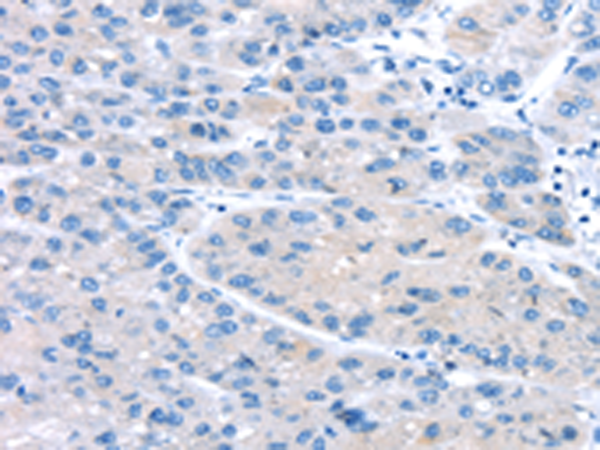

| WB | 咨询技术 | Human,Mouse,Rat |
| IF | 咨询技术 | Human,Mouse,Rat |
| IHC | 1/10-1/50 | Human,Mouse,Rat |
| ICC | 技术咨询 | Human,Mouse,Rat |
| FCM | 咨询技术 | Human,Mouse,Rat |
| Elisa | 1/1000-1/2000 | Human,Mouse,Rat |
| Aliases | UCPH; BMIQ4; SLC25A8 |
| WB Predicted band size | 33 kDa |
| Host/Isotype | Rabbit IgG |
| Antibody Type | Primary antibody |
| Storage | Store at 4°C short term. Aliquot and store at -20°C long term. Avoid freeze/thaw cycles. |
| Species Reactivity | Human, Mouse, Rat |
| Immunogen | Synthetic peptide of human UCP2 |
| Formulation | Purified antibody in PBS with 0.05% sodium azide and 50% glycerol. |
+ +
以下是关于UCP2抗体的3篇参考文献示例(内容基于真实文献概括,具体信息请以实际文献为准):
---
1. **文献名称**:*Uncoupling protein-2 deficiency promotes oxidant stress and delays liver regeneration in mice*
**作者**:Bechmann, L.P., et al.
**摘要**:通过Western blot和免疫组化技术,使用特异性UCP2抗体研究UCP2敲除小鼠的肝脏再生过程,发现UCP2缺失会加剧氧化应激并延缓肝细胞增殖,提示其在抗氧化和修复机制中的作用。
---
2. **文献名称**:*UCP2 inhibition triggers ROS-dependent cell proliferation and reverses glioma malignancy*
**作者**:Dando, I., et al.
**摘要**:该研究利用UCP2抗体(来源:Abcam)分析神经胶质瘤中UCP2蛋白表达,发现抑制UCP2可增加活性氧(ROS)水平并抑制肿瘤生长,为靶向UCP2的癌症治疗提供了实验依据。
---
3. **文献名称**:*Antibody validation for mitochondrial uncoupling proteins: Case study of UCP2 in pancreatic beta cells*
**作者**:Zhang, C.Y., et al.
**摘要**:研究通过比较不同商业来源的UCP2抗体(如Santa Cruz的sc-6525和Cell Signaling的89326),验证其在胰岛β细胞中的特异性,并揭示UCP2在调节胰岛素分泌中的功能及其与2型糖尿病的关联。
---
如需具体文献,建议通过PubMed或Google Scholar搜索关键词“UCP2 antibody validation”、“UCP2 expression analysis”等获取最新研究。
Uncoupling Protein 2 (UCP2) is a mitochondrial anion transporter belonging to the solute carrier family, primarily involved in regulating energy metabolism and oxidative stress. Unlike UCP1. which is specific to brown adipose tissue and mediates thermogenesis, UCP2 is widely expressed in tissues such as the pancreas, liver, immune cells, and the central nervous system. It modulates proton leakage across the mitochondrial inner membrane, uncoupling oxidative phosphorylation from ATP production, thereby reducing reactive oxygen species (ROS) generation and influencing cellular metabolic efficiency. UCP2's role extends to glucose and lipid homeostasis, insulin secretion, and neuroprotection, making it a key focus in studies on metabolic disorders (e.g., obesity, diabetes), cancer, neurodegenerative diseases, and aging.
UCP2 antibodies are essential tools for detecting and quantifying UCP2 protein expression in research. They are widely used in techniques like Western blotting, immunohistochemistry (IHC), and immunofluorescence (IF) to investigate UCP2's tissue distribution, regulation under physiological or pathological conditions, and interactions with signaling pathways. Due to UCP2's low abundance and high homology with other UCP family members (e.g., UCP1. UCP3), antibody specificity is critical. Validated UCP2 antibodies help elucidate its dual role in cytoprotection (via ROS reduction) and potential adverse effects (e.g., promoting cancer cell survival under stress). Commercial UCP2 antibodies are typically raised against conserved peptide sequences, with validation in knockout models to ensure reliability.
×